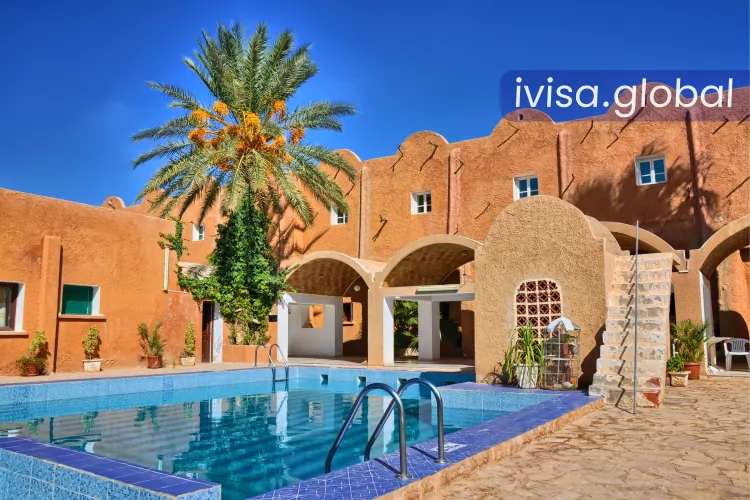Nestled in the heart of North Africa, Tunisia is a fascinating coastal nation, positioned along the Mediterranean shores and bordered by Algeria to the west and Libya to the southeast. Although it encompasses a relatively modest landmass of roughly 164,000 square kilometers, Tunisia boasts a wealth of historical, cultural, and natural treasures. As of April 2023, Worldometer estimates the country’s population to exceed 12 million inhabitants.
Tunisia has a Mediterranean climate with hot, dry summers and mild, rainy winters along the coast, but a desert climate with hot summers and cold winters in the interior. The best seasons to visit are spring and autumn, but coastal areas are pleasant all year.
Why Choose Tunisia?
Tunisia attracts its visitors with a rich tapestry of history, diverse cultural influences, and beautiful landscapes. This unique destination offers globetrotters a remarkable fusion of ancient archaeological sites, sun-kissed Mediterranean coastlines, and pleasant desert escapades. Regardless of your travel preferences, Tunisia guarantees an unforgettable and fulfilling adventure.
Tunisia’s attraction stems from its remarkable archaeological wonders, including the ancient city of Carthage and the remarkably preserved Roman amphitheater in El Djem. The country also takes pride in its stunning natural beauty, encompassing idyllic beaches in Hammamet and Sousse, as well as the expansive Sahara Desert. Tunisia’s warm and hospitable locals further enhance its appeal as a must-visit destination.
Tunisia Visa Types
Before beginning your Tunisian journey, it is crucial to find out the visa prerequisites based on your nationality, travel objectives, and intended duration of stay.
Tourist Visa
For a majority of nationalities, acquiring a tourist visa is not mandatory for brief stays in Tunisia (up to 90 days within a 180-day time frame). Citizens coming from the European Union, United States, Canada, Australia, and numerous other countries can effortlessly enter Tunisia for tourism purposes without a visa. Upon arrival, travelers receive a complimentary entry stamp in their passport, permitting a stay of up to 90 days.
Nonetheless, for citizens of countries not eligible for visa-free access, a short-stay tourist visa application at the nearest Tunisian consulate or embassy is necessary before journeying to Tunisia.
We explore the must-see tourist attractions that showcase Tunisia’s unique charm and character.
- Carthage: The ancient city of Carthage, a UNESCO World Heritage Site, is an archaeological goldmine steeped in history. Once the heart of the powerful Carthaginian Empire, these well-preserved ruins transport visitors back in time, providing a view into the grandeur of this once-thriving metropolis. Key highlights include the Antonine Baths, Byrsa Hill, and the Tophet of Carthage.
- El Djem Amphitheater: Another UNESCO World Heritage Site, the Roman amphitheater in El Djem is an astonishingly well-preserved structure that once hosted up to 35,000 spectators. This architectural masterpiece boasts impressive archways, corridors, and chambers, offering tourists an immersive experience into the world of ancient Rome.
- Sidi Bou Said: Famous for its blue-and-white color scheme, Sidi Bou Said is a picturesque hilltop village overlooking the Mediterranean Sea. Walking through the narrow cobblestone streets, marvel at the Andalusian architecture, and savor traditional Tunisian cuisine at a local café. This charming village is the perfect spot to unwind and enjoy the fascinating views.
- Medina of Tunis: The Medina of Tunis, a UNESCO World Heritage Site, is a labyrinth of narrow alleys, bustling souks, and impressive mosques. This ancient walled city offers a sensory feast, with the scent of spices filling the air and the vibrant colors of textiles and handicrafts captivating the eye. Don’t miss the Great Mosque of Zitouna, the Dar Lasram Museum, and the souks of Tunis for an authentic Tunisian experience.
- Bardo National Museum: The Bardo National Museum, housed in a 15th-century palace, showcases an extensive collection of Tunisian art, mosaics, and artifacts. This world-class museum offers a fascinating journey through Tunisia’s rich history, with exhibits spanning from the Phoenician era to the Islamic period.
- Hammamet and Sousse: For beach lovers, the coastal towns of Hammamet and Sousse are must-visit destinations. These popular resorts offer crystal-clear waters, golden sands, and a plenty of watersports activities. The ancient medinas in both towns also provide a great contrast to the modern beachfront hotels and amenities.
- Sahara Desert: The vast and beautiful Sahara Desert is an adventurer’s paradise. Experience the exhilarating beauty of the desert landscape on a camel trek, hot air balloon ride, or 4×4 adventure. The desert’s dramatic sand dunes, salt lakes, and unique plants and animals make it a once-in-a-lifetime experience.
Business Visa
Intending to explore Tunisia for business ventures? A business visa may be required. This particular visa grants a stay in Tunisia for a maximum of 90 days within a 180-day period. The application procedure closely resembles that of the tourist visa, requiring submission of pertinent documents, including an invitation letter from a Tunisian enterprise.
Student Visa
Aspiring students in Tunisia must obtain a student visa. The application process entails procuring a letter of admission from a Tunisian educational institution and presenting supplementary documentation, such as proof of financial resources and health insurance coverage. The student visa’s duration correlates with the length of your academic program.






